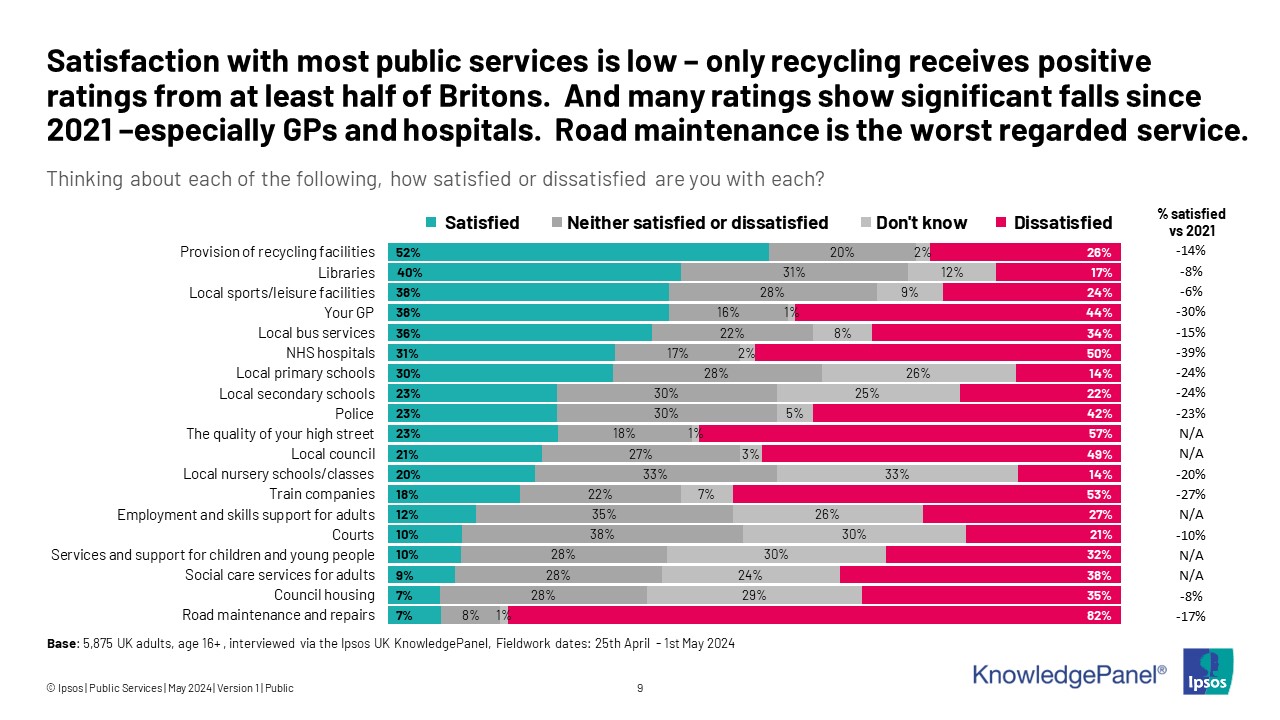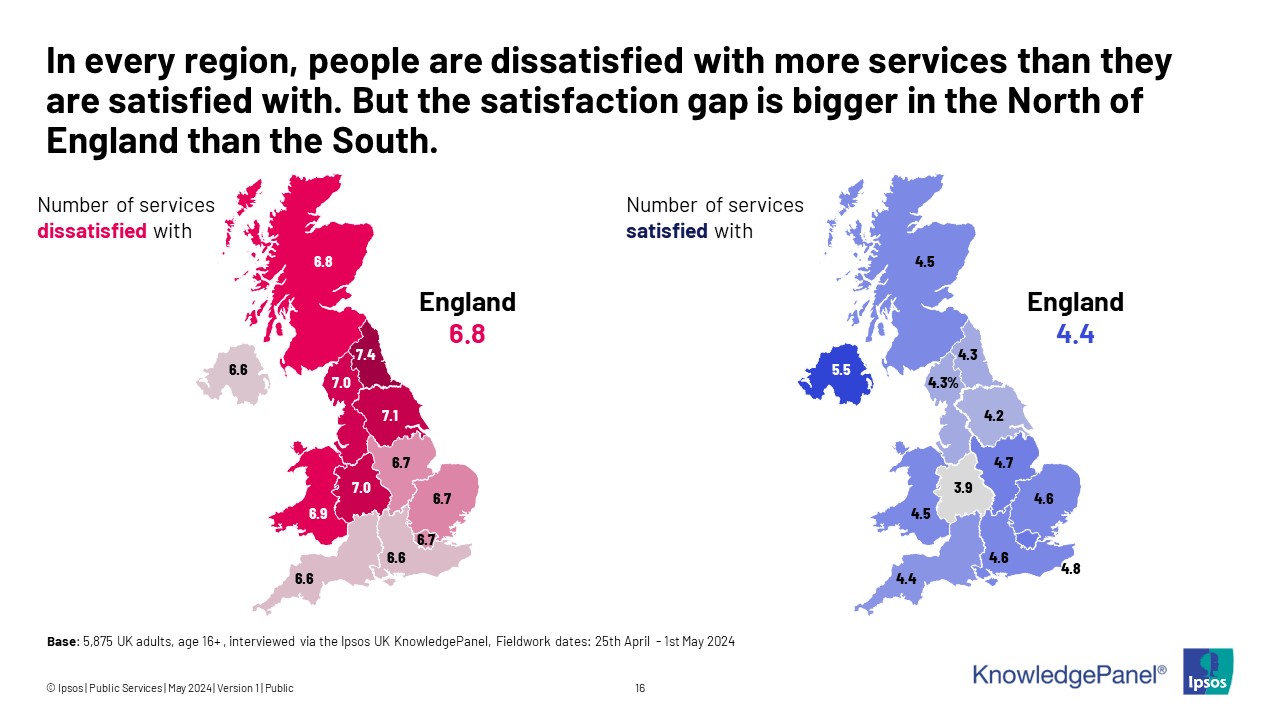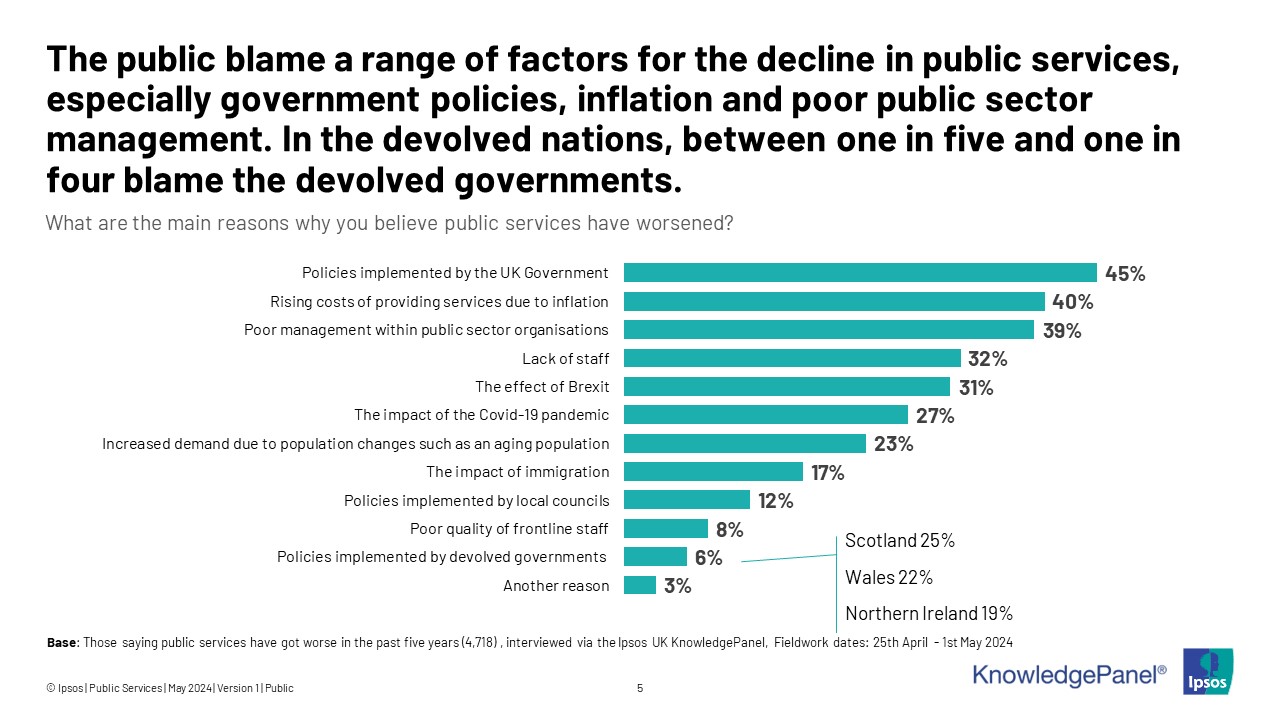Public Services Face Crisis of Confidence as Election Looms
With a general election approaching, a new Ipsos UK study reveals a public deeply dissatisfied with the state of public services in the UK, posing a significant challenge for Rishi Sunak and his government. The research, conducted in April-May 2024, paints a bleak picture of declining satisfaction across key sectors, fuelled by perceptions of underfunding, bureaucratic inefficiencies, and a lack of responsiveness to public needs.
The study, based on a survey of 5,875 UK adults, found that as many as three in four (76%) Britons believe public services have worsened in the last five years, a view held by all 2019 Labour, Conservative, and Liberal Democrat voters.
Although the public blame a range of factors, government policies, inflation, and poor public sector management are seen as the primary reasons behind the decline. While 2019 Labour and Liberal Democrat voters are more likely to blame the UK Government, followed by Brexit, inflation, and lack of staff, 2019 Conservative voters mostly blame poor management within public sector organizations, followed by inflation and immigration.
There is widespread pessimism about the future of public services, with only in 1 in 7 saying that public services will improve in the next five years, and only half thinking they will improve within 20 years.
Political consensus
- Overall, three in four (76%) of Britons believe that public services have gotten worse in the last five years.
- This sentiment is echoed across the political spectrum but is particularly high among those who voted Labour (86%) and Liberal Democrat (87%) in 2019.
Satisfaction with public services
- When asked about satisfaction with specific public services, only provision of recycling facilities (52% satisfied) receives a positive rating from at least half of Britons.
- Road maintenance and repairs scores lowest, at 82% dissatisfied. This is followed by the quality of high streets (57% dissatisfied) and train companies (53% dissatisfied).
- Many ratings show dramatic falls since 2021, particularly NHS hospitals (down 39 points) and GPs (down 30points).
- Satisfaction with local councils has also dropped significantly, from 40% satisfaction in 2021 to just 21% satisfaction in 2024.
- Those who have used or interacted with services in the last year are generally more satisfied than the general public, but satisfaction with GPs (40%), NHS hospitals (32%), police (23%) and train companies (21%) is just as low among service users. In many cases, user satisfaction with services has more than halved since 1998.
- On average, Britons are satisfied with only 4-5 public services out of the 19 asked in this survey, and they are dissatisfied with nearly 7 services on average.

Regional splits
- Respondents from across the UK are more likely to say that public services have got worse than better. People living in Scotland, Wales, the North East and South of England, rural areas, and less deprived areas are particularly likely to say public services have gotten worse.
- When asked about satisfaction with specific services, people in every region are dissatisfied with more services than satisfied. However, the satisfaction gap is larger in the North of England than the South.

Who is to blame?
- The public blame a range of factors for the decline in public services. Policies implemented by the UK Government are seen as the main reason (45%), followed by inflation (40%) and poor management within public sector organisations (39%).
- However, while 2019 Labour and Liberal Democrat voters are more likely to blame the UK Government, followed by Brexit, inflation, and lack of staff, 2019 Conservative voters mostly blame poor management within public sector organisations, followed by inflation and immigration.
- Most describe public services as under-funded (68%), as was the case in 1998. But people are less likely to use positive words like hardworking, keen to help or friendly to describe public services now than they were 26 years ago when Labour was last in power.
- Over half of Conservative voters describe public services as under-funded (55%), while Labour and Liberal Democrat 2019 voters are more likely to hold this view (83% and 84% respectively)

Pessimism about the future
- There is widespread pessimism about the future of public services. Just 1 in 7 Britons believe they will improve within the next 5 years (16%), and only half believe they will improve within the next 20 years (49%).
- Young people are more optimistic, with 57% believing there will be improvements within a decade.
- 2019 Labour and Liberal Democrat voters are more optimistic that public services will improve in the next ten years (49% and 50% respectively), while 2019 Conservative voters are split on whether improvements will be seen in 20 years – 43% say it is likely and 48% unlikely.
Trinh Tu, UK Managing Director, Public Affairs at Ipsos said:
Our data shows a staggering drop in public perceptions of public services since 2021. The majority of Britons are unsatisfied with public services, believe that they are only getting worse, and are pessimistic about them getting better.
The decline in satisfaction is particularly acute for NHS hospitals and GPs. Just last month, our Issues Index showed that the NHS is seen as the most important issue facing the country – therefore parties will want to demonstrate that they understand this dissatisfaction and have a clear plan to address it.
But while the negative outlook is prevalent across the political spectrum, who or what the public blames differs between the different voter groups, with 2019 Labour voters mostly blaming the government and Conservative voters blaming poor management of public sector organisations. No matter who ends up with the keys to Number 10 on 4th July, it is clear that they will face a mountain to climb in restoring the public’s faith in these vital services in the face of deep dissatisfaction and competing narratives of what caused the decline.
Technical note:
- This study was conducted on the Ipsos KnowledgePanel between 25th April – 1st May 2024. In total 5,875 interviews were achieved with residents across the United Kingdom aged 16+.
- The KnowledgePanel is a random probability survey panel. Panellists are recruited via a random probability unclustered address-based sampling method. This means that every household in the UK has a known chance of being selected to join the panel. Letters are sent to selected addresses in the UK (using the Postcode Address File) inviting them to become members of the panel. Members of the public who are digitally excluded are able to register to the KnowledgePanel either by post or by telephone, and are given a tablet, an email address, and basic internet which allows them to complete surveys online.
- The sample for this survey was stratified by nation and education. Design weights were applied to correct for unequal probabilities of selection of household members, as well as oversamples in devolved nations. Calibration weights were applied to correct for differential response rates using the latest population statistics relevant to the surveyed population to correct for imbalances in the achieved sample. Data was weighted on: nation and region, age, gender, IMD, qualifications, ethnicity, household size.




